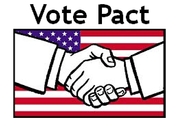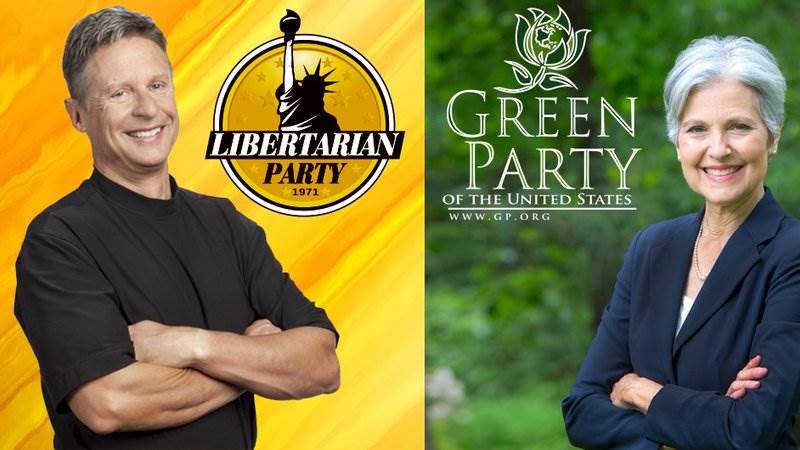Why Vote Third-Party?



For busier readers, here is the argument in outline form. The original article, slightly longer, follows. After that are
links of interest.
- Today we effectively have a staged elections, in which the Establishment (a.k.a. the System, the power
elite, the military-industrial-banking-oil-media-complex), presents two status quo (Republican and Democrat)
candidates.
- To prevent voters from voting for a non-Establishment (e.g., a Libertarian or Green Party) candidate, the Establishment
uses a divide-and-conquer strategy: (1) choose Republican/Democrat platform issues that polarize voter opinion as closely as
possible to a 50/50 split; (2) have horrible, frightening candidates for both parties; (3) by this means, manipulate voters
such that, to keep the more feared candidate from winning, they must vote for the other candidate; (4) crucial to this
strategy's success is to have several 'hot-button' issues (healthcare, gay marriage, taxing the rich, etc.), to scare voters
on both the left and right, and for news media focus on these issues so as to maximally inflame emotions.
- As a result, virtually everyone (98% in the 2012 presidential election) votes for the Democrat or Republican candidate,
maintaining the Establishment power elite. Nothing changes: wars, poverty, bad economy, no jobs, poor quality of life,
continued erosion of values and morale. Wealth transfer continues from citizens to corporate owners.
- Nomination of horrible Republican and Democrat candidates also means many voters will simply not vote, which again works
in the Establishment's favor.
- The
racket
will continue as long as it works; it will stop working when a substantial proportion of Americans vote for
third-party candidates.
- Voting for the Democrat or Republican candidate cannot be justified on the principle of choosing the lesser evil
. Regardless of which mainstream candidate is elected, the short-term (say, 4 to 6 years) outcome will be more or
less the same. Nothing much will change as long as the two big parties, and the same Establishment interests they represent,
control our country. But voting for third-party candidates now will potentially hasten the arrival of a time —
perhaps 10–20 years hence — when we do have a real choice, and real issues. Thus, the genuine 'lesser
evil' choice is to vote for a third-party candidate, even though one knows that the candidate won't be elected.
- Voting for a third-party candidate, therefore, will not throw your vote away. It will make a definite statement, both to
the Republican and Democratic parties, and to your fellow citizens.
- Even though they represent the same vested interests, there is enough rivalry between the Democratic and Republican
parties that, if third parties receive a sufficient proportion of the vote, they will begin to modify their platforms, making
more concessions to citizens.
- Further, voting for third-party presidential candidates will help third parties reach the critical threshold of
5% of the popular vote — at which point they will qualify for public campaign funding assistance.
- Those concerned that voting third-party will indirectly contribute to a Clinton or Trump victory can form
vote pacts. A disenfranchised Republican and disenfranchised Democrat
can pair up, both agreeing to vote third-party. That way both vote their conscience without feeling they
helped Trump or Clinton win.
Every nation gets the government it deserves. ~ Joseph de Maistre
Deserve better! Resist demagogy! Fight back!
Why Vote Third-Party?

My goal here is to convince you of sound reasons to vote for a third-party candidate -- ANY third-party
candidate -- in the presidential election.
The reasoning is simple:
First, it should be evident to all that the Democratic and Republican parties are 'in cahoots'. There's not much real difference
between them. Together they form a duopoly with absolute political and economic power. They distract public
attention by arguing about superficial differences, obscuring the fact that they agree on the major issues like:
- The BIG GOVERNMENT model is the only option
- America needs a huge military budget
- War is not insane
- No term limits
- The 'war on drugs'
- Whatever else, keep those campaign contributions rolling in!
Then why not just vote third-party? Here's the reason many people give:
"If I vote for a third party, wouldn't that throw my vote away?".
Let's dispel that myth once and for all. First, if one thing is plain, it's that you have thrown your vote
away if you vote for the Democrat or Republican candidate. The two parties are basically the same, and regardless of which party
is in power, things don't improve. Recall that it was both the Democrats and the Republicans who rushed into the Iraq war,
waving the flag, without a plan.
The truth is, the Republicrat duopoly has arranged so that we have a Democrat for one or two terms, then a Republican,
and then back again. It's a sweet system where both parties win. Neither is out of power for very long.
Consider also how both parties together have succeeded in making you feel you have to vote against someone. In 2000,
for example, you may not have liked Bush much, but felt you needed to vote against Al Gore, or vice versa. That, I propose, is
precisely what the two parties want. They have, by picking the right issues, managed to completely polarize the American public
into two camps, split almost 50/50. Further, they've set the tone of American politics as one of constant acrimony and argument.
Far too much attention is spent criticizing the other camp, and not enough on presenting new, positive ideas. It's a divide and conquer
strategy. By polarizing the American public, the Republicrat power coalition has kept people too busy fighting with each other
to see what the real problem is. It's the old case of 'let's you and him fight'.
This makes each person think, "My vote is essential to prevent the other party from winning; I can't afford to vote for a third-
party candidate, or someone with original ideas." But considering the dearth of good ideas among the current Republican and
Democrat candidates, it's evident that, whichever wins, we'll be stuck with another bad president for at least another four
years.
This November, then, you'll have two choices:
-
Vote for the Democrat or Republican candidate, in which case you truly will throw your vote away, or
-
Vote for a third-party candidate.
In the second case, it's true your candidate will not likely win. But you haven't thrown your vote away. If enough people do
this, then the Democrats and Republicans will get the message. By the time the next elections come around, they
will be thinking about adopting some of the ideas from the third parties. Further, any vote for a third party encourages the
founding of new third parties, with valuable new ideas.
The potential for positive change in America exists. What we must do is create a climate in which these ideas will come to the
fore in public discussion, and find implementation as social policy. Third parties can meet this vital need.
Therefore, here are two suggestions for you to consider:
-
Investigate the current third party candidates. Read their platforms and identify any promising ideas they have. In just doing
this you will have broken free from the mind-conditioning of the two-party system. You will be actively contributing to making
American a true democracy. Then, just consider voting for the candidate whom you would like to be president, not worrying about
the issue of 'throwing your vote away.'
-
If you're held back by the "votes for Stein (or Johnson) help elect Trump (or Clinton)" fallacy, consider forming a
vote pact with another voter.
-
Most of all — though this is really a separate issue — approach the election with a positive attitude. This
shouldn't be about whom you dislike or disagree with. It should be about developing positive vision of the
future. Pay particular attention to noticing how the big-party candidates (and their buddies, the news media) try to manipulate
public consciousness by eliciting anger and hatred — and then don't oblige them.
Be the change you want see in the world!
Links
My Articles
Other Contemporary Articles
Historical
Resources
Third Party Websites
|




